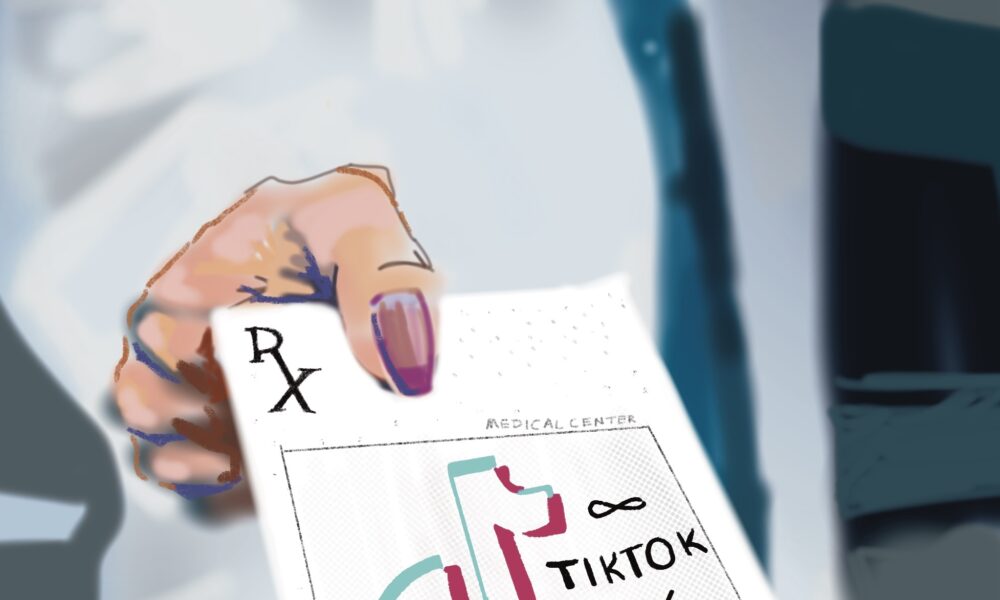It’s 1:00 p.m., and I’ve settled comfortably on my couch after a harrowing day of class. With last night’s leftovers in hand, I pull out my favourite entertainment receptacle––the iPhone––and begin a tricky balancing act, placing the bowl between my legs, a fork in one hand and my phone in the other. I unlock my phone and go immediately to the one app that will satisfy my ache for productivity: TikTok. The app acts as a fresh-pressed juice of self-indulgence, escapism, and education—the only means to easily absorb the internet’s vitamins and minerals.
The week of March 5, the United States Senate backed a bill that would support a ban on TikTok. Though Canada has yet to pass any similar legislation (beyond preventing anyone with a government-issued phone from using the app), I take personal preventative measures each day. Even if a ban goes into effect, a daily dosage of scrolling for an hour minimum will hopefully inscribe my mind with TikTok users’ numerous precepts. The algorithm assists in my success, presenting content just for me with a white satin glove. Amongst the odd celebrity drama or elaborate soap-making video, there are two types of TikToks that dominate my feed—lifestyle and news—each serving an essential purpose.
A pseudonym for individuals displaying their excess wealth, beauty, and other unobtainables, lifestyle TikToks, in their most primitive form, keep me fiercely humble while giving me something to work towards. “Outfit of the Day” videos (or more colloquially known as “OOTDs”) inspire my style, yet politely suggest that it’s unlikely I’d be able to pull off the pictured look.
TikTok news shapes my critical thinking, feeding me information that tests my scepticism with a fun game of “Real or Fake?” And I know that if I study enough Tucker Carlson clips, I can learn how to effectively and carelessly get enough people to believe my lies––an attribute that will certainly be useful when I enter the corporate workplace, with companies like Enron and Raytheon as my ideal employers, of course. Without these strangers’ OOTDs or fake (and actual) newscasters’ intelligible opinions, I’d be arrogant, lazy, poorly dressed, ignorant, unintelligent, and certainly not as humble. For my most redeeming attributes and presumably yours as well, we have the algorithm to thank.
If ever I’m upset by the reality that my family and friends cannot, unfortunately, read my thoughts, I receive the most wonderful consolation from the algorithm: A psychic mind that, somehow, just knows me. I feel a kinship with this inanimate system like it’s a childhood companion I grew up with, someone who can sense my likes and dislikes without asking or invading my psyche, but who knows when I need some tough love and even harsh criticism.
Excellent character and appearance are not the algorithm’s only irreplaceable contributions to the hordes of young people using TikTok daily. For academics like you and me, TikTok is the ideal mode of cultural production. The app is a place where artists create for other artists to consume at no economic cost. The algorithm ensures that the content gracing our screens matches our penchant for the highbrow. Evidently, people don’t use the platform to gain capital; each creator creates genuine art. What is a sponsored make-up routine if not a visceral reaction to, and expression of, beauty standards and gender roles or individuals reclaiming finances lost to the wage gap or opposing rampant stereotypes? Intellectual value saturates even a simple video of a gorilla eating a pineapple—providing an apt commentary on wild animals’ captivity and exploitation.
From CNN to Fox News, the usual rhetoric surrounding TikTok is all too negative (yet curiously, one of few things with bipartisan support in the United States). Without stealing and farming our data, the algorithm couldn’t feed us such personalized videos. How can something be so positively impactful on one’s appearance and attitude yet debilitating to their mental health?
We must end these harmful, propaganda-ridden ideas that further infect the media and general population with each new emerging “danger.” We must heed the truth: TikTok holds tremendous potential through which we can all learn and grow. If this absurd fear-mongering continues, Canada will be next in tow, falling down the same slippery TikTok-ban slope that the United States is currently falling into.








